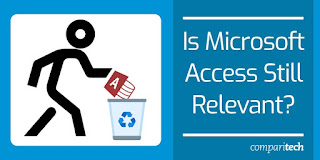.
Microsoft Access: Is it still relevant in 2021?
Microsoft Access is a time-worn relational database management system. It was innovative in its day but it faces a lot more competition in the RDBMS market today. Is it worth learning Access’s foibles to set up a personal database? Aren’t there better alternatives and newer options available? This topic has become increasingly divisive with industry opinions being quite split. We investigate.
STEPHEN COOPER
@VPN_News UPDATED: May 20, 2021
Is Microsoft Access going away?
Is MS Access still used? Some History
Microsoft Office is almost 30 years old – it was launched in November 1990. Not many software packages have enjoyed such longevity. However, the Microsoft bundle hasn’t stayed the same over the years. Some elements get added, while others get dropped. One component of the productivity suite that is still in there is Microsoft Access.
Access debuted in 1992. Microsoft had struggled to produce a desktop DBMS for years and fast-tracked the development process by buying up one of the sector’s market leaders, FoxPro. Although Microsoft continued to market and develop FoxPro, it was able to pick at some of the code and services of its new acquisition to bump-start its own database engine project. The transfusion was successful.
Access rode on the success of Windows. The package’s main rivals failed to spot the rise in this operating system and didn’t release Windows versions fast enough. Microsoft also killed off FoxPro to make room in the market for MS Access. The success of the tool increased when it was included in Microsoft Office in 1995.
The tool then became part of the Microsoft Office evolutionary pipeline with a requirement to get overhauled regularly in synchronization with the development of other Office components. This really took Access to the next level.
One problem with Microsoft Access is that it has its own file format that isn’t compatible with any other system. While Microsoft adopted an OpenDocument Format-compatible XML-based file structure for Excel and Word, it left the old file structure of Access alone.
The .docx and .xmlx file formats of Word and Excel have become the universal touchstone of file types in their respective application fields. However, the .accdb format used by Access never caught the public’s imagination and other developers of rival productivity suites weren’t interested in building Access file compatibility into their desktop database applications.
A common use of Microsoft Access is to keep it as a front end to more commercially successful DBMSs. For example, Access can attach to an Oracle database, so business applications written in Access can connect through to data held in an Oracle database. Access can also front for SQL Server and Sybase. However, this repurposing of the Access application feels a little like a half-life. Is this the last resort for Access, acting as a skin to more successful RDBMSs?
As the demand for Access programming language skills lessens, fewer programmers bother to learn the system. This begins a cycle of decline where the lack of an available developer skills pool puts project managers off from using an environment to develop a new product. So, the shortage of programmers with data management skills creates a shortage of projects in that language and the lack of demand for those skills makes mastering that language a poor career move. Thus, the skills pool shrinks further and the cycle of decline continues. Microsoft Access could be following COBOL, FoxPro, and SQLBase down the path to oblivion.
MS Access faced an uncertain future
Continue: https://www.comparitech.com/net-admin/microsoft-access/
.



